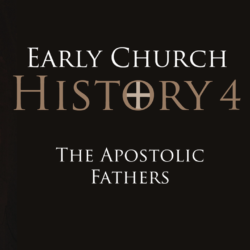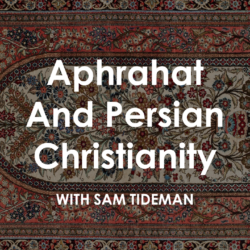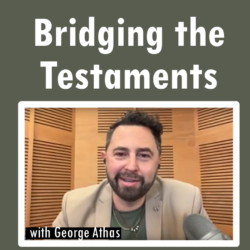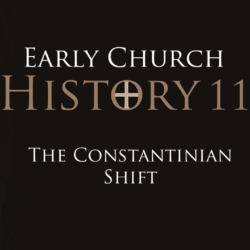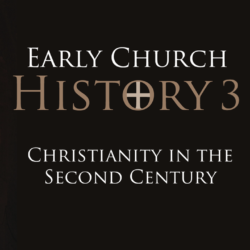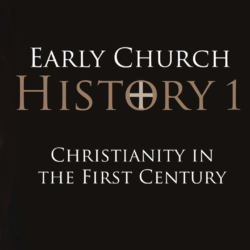Hear the winding tale of early Christian history in the Americas with a special focus on the thirteen colonies. Right from the start the Americas were full of Christian diversity including Catholicism, the Church of England, Puritans, Baptists, and Quakers. In this lecture you’ll see how this diversity led to an unprecedented level of religious tolerance and flourishing. Other significant issues in this period include the horrors of the slave trade and the treatment of native Americans as well as the impressive success of the Great Awakening under the preaching of George Whitefield and Jonathan Edwards.
This is lecture 12 of a history of Christianity class called Five Hundred: From Martin Luther to Joel Osteen.
All the notes are available here as a pdf.
—— Notes ——
Founding the Colonies
- Catholicism in the Americas
- Spanish claims included American west coast, Florida, and much territory in central and South America (Catholic)
- French claims included eastern Canada (Quebec) and the territory of Louisiana (Catholic)
- 1634 Catholics founded “Mary land”
- 1607 Virginia founded as first English Colony
- founded as joint effort by the Virginia Company to make money (Tobacco export)
- brought Church of England to New World
- Separatists founded New England
- 1620 Plymouth settled (from Brownists who were sojourning in Holland)
- 1630 Puritans establish Massachusetts Bay Colony fleeing from Archbishop Laud
- 1648 Cambridge Platform: Westminster Confession w/ congregational polity
- No religious freedom
- 1636 Harvard founded for training of Puritan ministers
- 1631 Roger Williams (1603?-1683) arrived
- 1639 Williams founds first Baptist church in RI
- 1681 William Penn founded Pennsylvania (Penn’s Forrest)
- he was a Quaker who tolerated all monotheists
- many people outside of England moved to Pennsylvania including Moravians, Lutherans, German Reformed, Amish
Immorality
- tobacco
- 1602 an English doctor wrote Chimney-Sweepers or a Warning for Tabacconists warning about health risks
- 1604 King James wrote a tract against tobacco
- 1617 Virginia exported 10 tons; 1622 30 tons; 1627 250 tons; 1639 1,500 tons; 1688 colonies exported 14,000 tons; 1771 52,000 tons
- rum
- 1667 Boston’s first distillery
- 1774 Mass had 63 distilleries, producing 2.7 million gallons of rum a year
- RI had more than 30 distilleries
- colonists preferred rum made in the West Indies so they sold it in Africa and to Indians
- Golden Triangle
- molasses bought in New England to make rum
- rum sold in Africa to purchase slaves
- slaves sold in West Indies to purchase molasses
- slavery
- 1619 first Africans came to VA as indentured servants (work for a set time to pay off travel debt)
- by 1680 racial slavery
- insanely inhumane conditions on slave trader ships
- Falconhridge: “The hardships and inconveniences suffered by the Negroes during the passage are scarcely to be enumerated or conceived. They are far more violently affected by seasickness than the Europeans. It frequently terminates in death, especially among the women.The exclusion of fresh air is among the most intolerable. Most ships have portholes for air. But whenever the sea is rough and the rain heavy, it becomes necessary to shut these and every other conveyance by which air is admitted. The fresh air being thus excluded, the Negroes’ quarters very soon grow intolerably hot. The confined air, rendered noxious by the smell exhaled from their bodies and by being repeatedly breathed, soon produces fevers and diarrhea, which generally cause death to great numbers of them.… My profession requiring it, I frequently went down among them, till at length their compartments became so extremely hot as to be only sufferable for a very short time.But the excessive heat was not the only thing that rendered their situation intolerable. The deck, that is, the floor of their quarters, was so covered with blood and excrement which had proceeded from them in consequence of the diarrhea, that it resembled a slaughterhouse. It is not in the power of human imagination to picture a situation more dreadful or more disgusting.”[1]
- treatment widely varied in Colonies, though plantation owners were
- deliberate effort to limit African from exposure to education or Christianity
- treatment of natives
- had a totally different philosophy of land as something to occupy or use but not to own
- just imagine if a boat of Indians came to a deserted part of English forest and built a community and then over time more and more ships came, causing them to spread out
- alcoholism
- brutal massacres
- 1692 Salem Witch Trials in which 150 were arrested and 19 hung on the charge of witchcraft
- rebellion and vandalism against British (i.e. Boston Tea Party)
Methodists
- John Wesley (1703-1791) grew up Anglican
- 1736 Wesley travels to George to preach to the natives
- 1738 converted while listening to a reading from Luther’s commentary on Romans
- “About a quarter before nine, I felt my heart strangely warmed. I felt I did trust in Christ alone for salvation: And an assurance was given me, that he had taken away my sins, even mine, and saved me.”[2]
- outdoor revival preacher throughout England (preaching to coal miners)
- methodical approach to Christianity got him the name “Methodist” (75 million today)
- strongly opposed slavery and the revolution of the colonialists
- Charles Welsey (1707-1788)
- very close to John, Anglican priest, strongly opposed breach with C of E, hymn writer
Great Awakening (1731-1755)
- George Whitefield (1714-1770)
- Anglican Calvinist priest and Methodist (close colleague of Welsey)
- Best known preacher in Britain and America in the 18th
- 1740 preaching tour of the colonies (8 out of 10 heard him)
- Benjamin Franklin wrote:
- “In 1739 arriv’d among us from England the Rev. Mr. Whitefield, who had made himself remarkable there as an itinerant Preacher. He was at first permitted to preach in some of our Churches; but the Clergy taking a Dislike to him, soon refus’d him their Pulpits and he was oblig’d to preach in the Fields. The Multitudes of all Sects and Denominations that attended his Sermons were enormous and it was [a] matter of Speculation to me who was one of the Number, to observe the extraordinary Influence of his Oratory on his Hearers, and how much they admir’d and respected him, notwithstanding his common Abuse of them, by assuring them they were naturally half Beasts and half Devils. It was wonderful to see the Change soon made in the Manners [behavior] of our Inhabitants; from being thoughtless or indifferent about Religion, it seem’d as if all the World were growing Religious; so that one could not walk thro’ the Town in an Evening without Hearing Psalms sung in different Families of every Street. …
I happened soon after to attend one of his Sermons, in the Course of which I perceived he intended to finish with a Collection, and I silently resolved he should get nothing from me. I had in my Pocket a Handful of Copper Money, three or four silver Dollars, and five Pistoles [Spanish coins] in Gold. As he proceeded I began to soften, and concluded to give the Coppers. Another Stroke of his Oratory made me asham’d of that, and determin’d me to give the Silver; and he finish’d so admirably, that I emptied my Pocket wholly into the Collector’s Dish, Gold and all. (Autobiography of Benjamin Franklin)
- “In 1739 arriv’d among us from England the Rev. Mr. Whitefield, who had made himself remarkable there as an itinerant Preacher. He was at first permitted to preach in some of our Churches; but the Clergy taking a Dislike to him, soon refus’d him their Pulpits and he was oblig’d to preach in the Fields. The Multitudes of all Sects and Denominations that attended his Sermons were enormous and it was [a] matter of Speculation to me who was one of the Number, to observe the extraordinary Influence of his Oratory on his Hearers, and how much they admir’d and respected him, notwithstanding his common Abuse of them, by assuring them they were naturally half Beasts and half Devils. It was wonderful to see the Change soon made in the Manners [behavior] of our Inhabitants; from being thoughtless or indifferent about Religion, it seem’d as if all the World were growing Religious; so that one could not walk thro’ the Town in an Evening without Hearing Psalms sung in different Families of every Street. …
- Jonathan Edwards (1703-1758)
- Reformed theologian thought conversion was primarily emotional not intellectual
- 1741 Edwards preached “Sinners in the Hand of an Angry God”
- “The God that holds you over the pit of hell, much as one holds a spider, or some loathsome insect over the fire, abhors you, and is dreadfully provoked: his wrath towards you burns like fire; he looks upon you as worthy of nothing else, but to be cast into the fire; he is of purer eyes than to bear to have you in his sight; you are ten thousand times more abominable in his eyes, than the most hateful venomous serpent is in ours. You have offended him infinitely more than ever a stubborn rebel did his prince; and yet it is nothing but his hand that holds you from falling into the fire every moment. It is to be ascribed to nothing else, that you did not go to hell the last night; that you was suffered to awake again in this world, after you closed your eyes to sleep. And there is no other reason to be given, why you have not dropped into hell since you arose in the morning, but that God’s hand has held you up. There is no other reason to be given why you have not gone to hell, since you have sat here in the house of God, provoking his pure eyes by your sinful wicked manner of attending his solemn worship. Yea, there is nothing else that is to be given as a reason why you do not this very moment drop down into hell.
O sinner! Consider the fearful danger you are in: it is a great furnace of wrath, a wide and bottomless pit, full of the fire of wrath, that you are held over in the hand of that God, whose wrath is provoked and incensed as much against you, as against many of the damned in hell. You hang by a slender thread, with the flames of divine wrath flashing about it, and ready every moment to singe it, and burn it asunder; and you have no interest in any Mediator, and nothing to lay hold of to save yourself, nothing to keep off the flames of wrath, nothing of your own, nothing that you ever have done, nothing that you can do, to induce God to spare you one moment
…Therefore, let every one that is out of Christ, now awake and fly from the wrath to come. The wrath of Almighty God is now undoubtedly hanging over a great part of this congregation. Let every one fly out of Sodom: “Haste and escape for your lives, look not behind you, escape to the mountain, lest you be consumed.” [3]
- 1734-1735 revival in Northampton
- 1758 President of Princeton University
- Results of Great Awakening
- 1764 Baptists grew b/c of Great Awakening founded Brown University
- Split in NE Puritanism between supporters (New Lights) and detractors (Old Calvinists)
- Abolitionist movement started (including students of Jonathan Edwards)
- awakening continued until 1750s
Revolution and Separation of Church and State
- Most churches endorsed the revolt
- stopped preaching revival sermons to endorse revolution
- The cause of America is the cause of Christ
- John Witherspoon (1723-1794)
- preached for resisting tyranny; signed Declaration of Independence
- Some Christians opposed the revolt
- Anglicans, Methodists, Quakers, and Mennonites
- many lost their property
- Post War Religious Policy in United States
- 1785 Virginia Statue of Religious Freedom
- 1787 Constitution: no religious test for federal offices
- 1791 Bill of Rights (First Amendment)
- “Congress shall make no law respecting an establishment of religion, or prohibiting the free exercise thereof”
- Separation of Church and State
- this phrase does not appear in the Constitution
- John Locke had gotten this from Polish Socinians (Anabaptists)
- Thomas Jefferson:
“Believing with you that religion is a matter which lies solely between Man & his God, that he owes account to none other for his faith or his worship, that the legitimate powers of government reach actions only, & not opinions, I contemplate with sovereign reverence that act of the whole American people which declared that their legislature should ‘make no law respecting an establishment of religion, or prohibiting the free exercise thereof,’ thus building a wall of separation between Church and State.” (Jefferson’s Letter to the Danbury Baptists)
- James Madison
We are teaching the world that religion flourishes in greater purity w/o government
[1] David Bercot, In God We Don’t Trust (Amberson, PA: Scroll Publishing 2011), pp. 68-70.
[2] Timothy Paul Jones, Christian History Made Easy (Torrance, CA: Rose Publishing 2009), p. 144.
[3] http://www.ccel.org/ccel/edwards/sermons.sinners.html
—— Links ——
- For this lecture I used A History of Christianity in the United States and Canada by Mark Noll and In God We Don’t Trust by David Bercot
- See all the episodes of Five Hundred: From Martin Luther to Joel Osteen.
- The three main textbooks for this class include:
- The European Reformations by Carter Lindberg
- The Radical Reformation by George Williams
- Modern Church History by Tim Grass
- Check out these other Restitutio historical podcasts
- Intro music: “District Four” by Kevin MacLeod. Licensed under Creative Commons: By Attribution 3.0 License.

